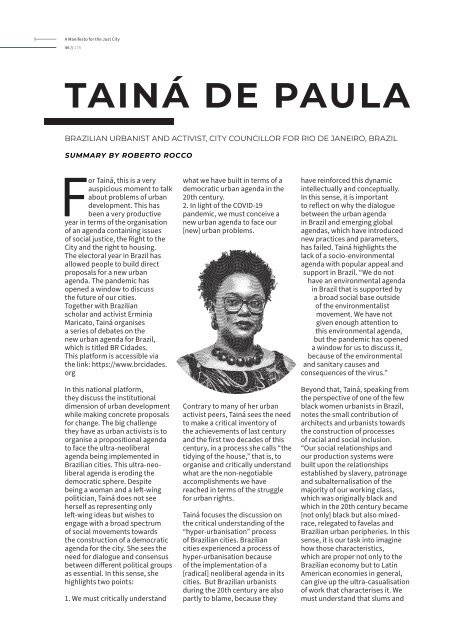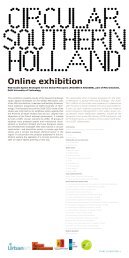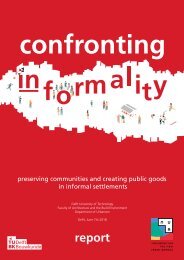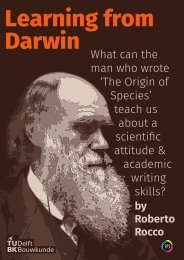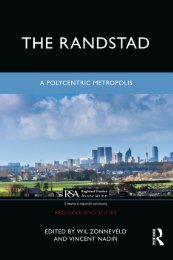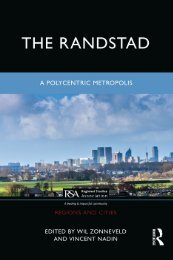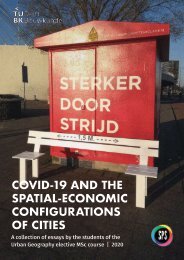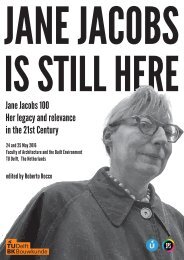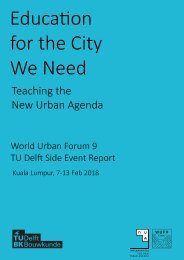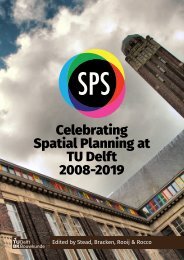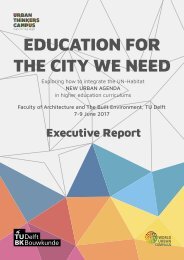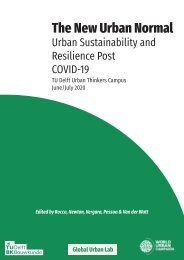A Manifesto for the Just City
On Monday 29 MARCH at 18:00 (CET/Amsterdam), TU Delft launched the Book "A Manifesto for the Just City", with texts by a number of guests and 43 manifestos written by students from 25 universities from all over the world. A “Manifesto for the Just City” comes in the wake of the realisation that socio-spatial justice is a crucial dimension for sustainability transitions. Growing inequality and the erosion of the public sphere undermine the social and political structures required to fight climate change, pandemics and other systemic shocks. With this book, we have sought to encourage students to formulate their own visions for the Just City and for a just transition. This book is result of an Urban Thinkers Campus organised between 9 and 30 November 2020. The Urban Thinkers Campus (UTC) model is an initiative of UN-Habitat’s World Urban Campaign, conceived in 2014 as an open space for critical exchange between stakeholders and partners. It aims to promote debate and action on sustainable and inclusive urbanization upholding the principles and guidelines contained in the New Urban Agenda, launched at Habitat-III in 2016 in Quito, Ecuador.
On Monday 29 MARCH at 18:00 (CET/Amsterdam), TU Delft launched the Book "A Manifesto for the Just City", with texts by a number of guests and 43 manifestos written by students from 25 universities from all over the world.
A “Manifesto for the Just City” comes in the wake of the realisation that socio-spatial justice is a crucial dimension for sustainability transitions. Growing inequality and the erosion of the public sphere undermine the social and political structures required to fight climate change, pandemics and other systemic shocks. With this book, we have sought to encourage students to formulate their own visions for the Just City and for a just transition.
This book is result of an Urban Thinkers Campus organised between 9 and 30 November 2020. The Urban Thinkers Campus (UTC) model is an initiative of UN-Habitat’s World Urban Campaign, conceived in 2014 as an open space for critical exchange between stakeholders and partners. It aims to promote debate and action on sustainable and inclusive urbanization upholding the principles and guidelines contained in the New Urban Agenda, launched at Habitat-III in 2016 in Quito, Ecuador.
Create successful ePaper yourself
Turn your PDF publications into a flip-book with our unique Google optimized e-Paper software.
A <strong>Manifesto</strong> <strong>for</strong> <strong>the</strong> <strong>Just</strong> <strong>City</strong><br />
46 // 276<br />
TAINÁ DE PAULA<br />
BRAZILIAN URBANIST AND ACTIVIST, CITY COUNCILLOR FOR RIO DE JANEIRO, BRAZIL<br />
SUMMARY BY ROBERTO ROCCO<br />
For Tainá, this is a very<br />
auspicious moment to talk<br />
about problems of urban<br />
development. This has<br />
been a very productive<br />
year in terms of <strong>the</strong> organisation<br />
of an agenda containing issues<br />
of social justice, <strong>the</strong> Right to <strong>the</strong><br />
<strong>City</strong> and <strong>the</strong> right to housing.<br />
The electoral year in Brazil has<br />
allowed people to build direct<br />
proposals <strong>for</strong> a new urban<br />
agenda. The pandemic has<br />
opened a window to discuss<br />
<strong>the</strong> future of our cities.<br />
Toge<strong>the</strong>r with Brazilian<br />
scholar and activist Erminia<br />
Maricato, Tainá organises<br />
a series of debates on <strong>the</strong><br />
new urban agenda <strong>for</strong> Brazil,<br />
which is titled BR Cidades.<br />
This plat<strong>for</strong>m is accessible via<br />
<strong>the</strong> link: https://www.brcidades.<br />
org<br />
In this national plat<strong>for</strong>m,<br />
<strong>the</strong>y discuss <strong>the</strong> institutional<br />
dimension of urban development<br />
while making concrete proposals<br />
<strong>for</strong> change. The big challenge<br />
<strong>the</strong>y have as urban activists is to<br />
organise a propositional agenda<br />
to face <strong>the</strong> ultra-neoliberal<br />
agenda being implemented in<br />
Brazilian cities. This ultra-neoliberal<br />
agenda is eroding <strong>the</strong><br />
democratic sphere. Despite<br />
being a woman and a left-wing<br />
politician, Tainá does not see<br />
herself as representing only<br />
left-wing ideas but wishes to<br />
engage with a broad spectrum<br />
of social movements towards<br />
<strong>the</strong> construction of a democratic<br />
agenda <strong>for</strong> <strong>the</strong> city. She sees <strong>the</strong><br />
need <strong>for</strong> dialogue and consensus<br />
between different political groups<br />
as essential. In this sense, she<br />
highlights two points:<br />
1. We must critically understand<br />
what we have built in terms of a<br />
democratic urban agenda in <strong>the</strong><br />
20th century.<br />
2. In light of <strong>the</strong> COVID-19<br />
pandemic, we must conceive a<br />
new urban agenda to face our<br />
[new] urban problems.<br />
Contrary to many of her urban<br />
activist peers, Tainá sees <strong>the</strong> need<br />
to make a critical inventory of<br />
<strong>the</strong> achievements of last century<br />
and <strong>the</strong> first two decades of this<br />
century, in a process she calls “<strong>the</strong><br />
tidying of <strong>the</strong> house,” that is, to<br />
organise and critically understand<br />
what are <strong>the</strong> non-negotiable<br />
accomplishments we have<br />
reached in terms of <strong>the</strong> struggle<br />
<strong>for</strong> urban rights.<br />
Tainá focuses <strong>the</strong> discussion on<br />
<strong>the</strong> critical understanding of <strong>the</strong><br />
“hyper-urbanisation” process<br />
of Brazilian cities. Brazilian<br />
cities experienced a process of<br />
hyper-urbanisation because<br />
of <strong>the</strong> implementation of a<br />
[radical] neoliberal agenda in its<br />
cities. But Brazilian urbanists<br />
during <strong>the</strong> 20th century are also<br />
partly to blame, because <strong>the</strong>y<br />
have rein<strong>for</strong>ced this dynamic<br />
intellectually and conceptually.<br />
In this sense, it is important<br />
to reflect on why <strong>the</strong> dialogue<br />
between <strong>the</strong> urban agenda<br />
in Brazil and emerging global<br />
agendas, which have introduced<br />
new practices and parameters,<br />
has failed. Tainá highlights <strong>the</strong><br />
lack of a socio-environmental<br />
agenda with popular appeal and<br />
support in Brazil. “We do not<br />
have an environmental agenda<br />
in Brazil that is supported by<br />
a broad social base outside<br />
of <strong>the</strong> environmentalist<br />
movement. We have not<br />
given enough attention to<br />
this environmental agenda,<br />
but <strong>the</strong> pandemic has opened<br />
a window <strong>for</strong> us to discuss it,<br />
because of <strong>the</strong> environmental<br />
and sanitary causes and<br />
consequences of <strong>the</strong> virus.”<br />
Beyond that, Tainá, speaking from<br />
<strong>the</strong> perspective of one of <strong>the</strong> few<br />
black women urbanists in Brazil,<br />
notes <strong>the</strong> small contribution of<br />
architects and urbanists towards<br />
<strong>the</strong> construction of processes<br />
of racial and social inclusion.<br />
“Our social relationships and<br />
our production systems were<br />
built upon <strong>the</strong> relationships<br />
established by slavery, patronage<br />
and subalternalisation of <strong>the</strong><br />
majority of our working class,<br />
which was originally black and<br />
which in <strong>the</strong> 20th century became<br />
[not only] black but also mixedrace,<br />
relegated to favelas and<br />
Brazilian urban peripheries. In this<br />
sense, it is our task into imagine<br />
how those characteristics,<br />
which are proper not only to <strong>the</strong><br />
Brazilian economy but to Latin<br />
American economies in general,<br />
can give up <strong>the</strong> ultra-casualisation<br />
of work that characterises it. We<br />
must understand that slums and


